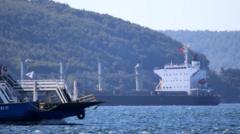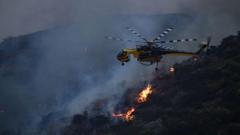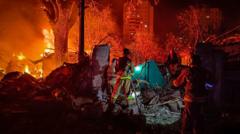As wildfires rage across Spain, claiming the lives of three individuals, the European Union is responding by sending two Canadair water bomber aircraft to aid firefighting efforts. This activation of the EU disaster assistance mechanism is unprecedented for Spain and highlights the growing intensity and frequency of wildfires across Europe, further exacerbated by a relentless heatwave affecting several nations.
**EU Mobilizes Air Support for Spain as Wildfire Toll Climbs**

**EU Mobilizes Air Support for Spain as Wildfire Toll Climbs**
The European Union steps in to aid Spain in combating severe wildfires, marking its first activation of the EU disaster assistance mechanism for fire management.
The article text follows:
Firefighters are battling fierce wildfires in Spain, leading to the loss of at least three lives, including a civilian and a volunteer firefighter. In response to this crisis, Spain's Interior Minister Fernando Grande-Marlaska announced that the country invoked the EU disaster assistance mechanism for the first time. Acting swiftly, he has requested the deployment of two Canadair water bomber aircraft to the most affected regions.
As the nation continues to grapple with soaring temperatures—predictably surpassing 44 degrees Celsius—the state weather agency AEMET has warned that the spread of these wildfires poses an escalating concern. Grande-Marlaska reassured the public that while immediate deployment of the aircraft may not be essential, their availability is a precautionary measure as the fiery conditions persist.
Evacuations have intensified nationwide, with the western city of Caceres reporting around 700 residents displaced on Wednesday alone, as the Civil Guard worked diligently to relocate those in potentially hazardous areas. Progressive waves of evacuation are ongoing, reflecting the growing threat as more fires ignite amidst the extreme heat.
Prime Minister Pedro Sanchez expressed his condolences and solidarity with the families of those who perished, emphasizing that all governmental resources are mobilized to confront this dire situation. "The threat remains extreme," he echoed in his social media statements.
In addition to Spain, other countries experiencing similar issues—such as Greece, Bulgaria, Montenegro, and Albania—are also enlisting EU assistance as they face significant wildfires. The Civil Protection Mechanism allows nations across Europe to request emergency support during natural disasters, and this collaborative effort reflects the severity of the current climatic situation affecting the continent.
In Greece, where wildfires have been persistent for three days, there have been extensive evacuations and reports of injuries among civilians and firefighting personnel. The flames, particularly fierce on the island of Chios and in parts of Peloponnese, have necessitated urgent actions to safeguard residents, including evacuations by sea.
So far this year, the EU's Copernicus Emergency Management Service recorded significant losses, with over 439,000 hectares of land scorched by wildfires—an alarming increase from the previous year's total. The frequency and ferocity of these wildfires serve as an urgent reminder of the pressing implications of climate change and the need for coordinated international responses in the face of natural disasters.
Firefighters are battling fierce wildfires in Spain, leading to the loss of at least three lives, including a civilian and a volunteer firefighter. In response to this crisis, Spain's Interior Minister Fernando Grande-Marlaska announced that the country invoked the EU disaster assistance mechanism for the first time. Acting swiftly, he has requested the deployment of two Canadair water bomber aircraft to the most affected regions.
As the nation continues to grapple with soaring temperatures—predictably surpassing 44 degrees Celsius—the state weather agency AEMET has warned that the spread of these wildfires poses an escalating concern. Grande-Marlaska reassured the public that while immediate deployment of the aircraft may not be essential, their availability is a precautionary measure as the fiery conditions persist.
Evacuations have intensified nationwide, with the western city of Caceres reporting around 700 residents displaced on Wednesday alone, as the Civil Guard worked diligently to relocate those in potentially hazardous areas. Progressive waves of evacuation are ongoing, reflecting the growing threat as more fires ignite amidst the extreme heat.
Prime Minister Pedro Sanchez expressed his condolences and solidarity with the families of those who perished, emphasizing that all governmental resources are mobilized to confront this dire situation. "The threat remains extreme," he echoed in his social media statements.
In addition to Spain, other countries experiencing similar issues—such as Greece, Bulgaria, Montenegro, and Albania—are also enlisting EU assistance as they face significant wildfires. The Civil Protection Mechanism allows nations across Europe to request emergency support during natural disasters, and this collaborative effort reflects the severity of the current climatic situation affecting the continent.
In Greece, where wildfires have been persistent for three days, there have been extensive evacuations and reports of injuries among civilians and firefighting personnel. The flames, particularly fierce on the island of Chios and in parts of Peloponnese, have necessitated urgent actions to safeguard residents, including evacuations by sea.
So far this year, the EU's Copernicus Emergency Management Service recorded significant losses, with over 439,000 hectares of land scorched by wildfires—an alarming increase from the previous year's total. The frequency and ferocity of these wildfires serve as an urgent reminder of the pressing implications of climate change and the need for coordinated international responses in the face of natural disasters.



















